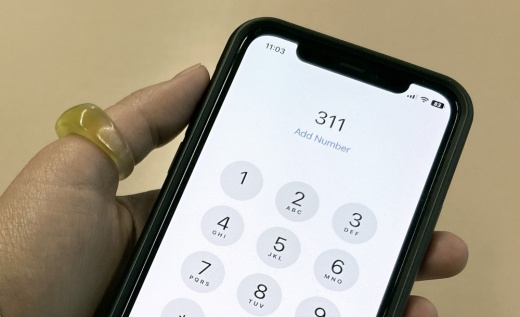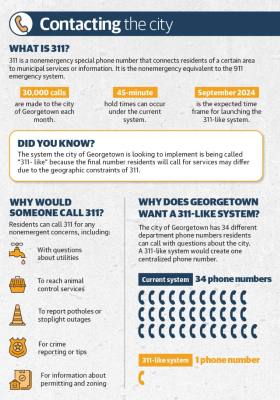311 is a non-emergency phone line that residents can call to get information about nonemergency services, file complaints, or report issues like abandoned vehicles, sidewalk and road repairs, failed traffic signals, and much more.
Over the past 10 years, the city of Georgetown has seen an increase in both 911 calls as well as calls for nonemergency city services, according to city officials.
Under the current system, whenever residents need to contact the city they can call the city’s main number and be transferred between departments until they reach the correct person, often resulting in time on hold, Assistant City Manager Laurie Brewer said. Alternatively, there are 34 different department phone numbers residents could call.
A 311-like system would give residents one number to call to access information about all departments, Brewer said. This system would maintain separate 911 dispatchers for emergencies.
“[Recent events] made us really look at how many different departments had separate phone numbers, how confused people could get when they don't know exactly who to call,” Brewer said.
Over the course of the next year, Georgetown officials will work to budget for, staff and develop the knowledge needed to implement the 311-like system, Development Support Manager Seth Gipson said. Officials said they hope to launch it in September 2024.
“While we know it’s a big lift, there are some significant improvements and benefits that will really help the citizens as well as departments across the city,” Gipson said during the Jan. 24 City Council meeting.
Simplifying the system
In September 2022, the city completed a survey where residents could provide feedback on how they want the city to interact with them.
The City of Georgetown currently receives about 30,000 calls per month on average, Gipson said to the City Council.
The survey showed the top five reasons the city is contacted are electric or water problems, garbage or recycling, 911 emergencies, non-emergency fire and police concerns, and public works needs such as traffic signals, roads and flooding. Other common calls to the city were for animal control, permitting and code compliance.
Each of these calls is currently handled by a different department. If a resident were to call the wrong number they would be transferred internally, leading to extensive hold times and often resulting in the resident hanging up, Brewer said.
“In talking with the Council, they had a strong interest in consolidating our customer response team,” Brewer said. “They wanted to figure out a way to help people more directly and just provide better service and more consistent answers.”
Through the survey, residents provided open-ended feedback on the help they received from the city. Some of the comments suggested included being able to speak with a live person, not having a convoluted call tree, eliminating excessive wait times, and receiving faster response times to questions.
The city is working with the International City/County Management Association, an organization that provides local government entities assistance with implementing best practices. Over the last four months, the ICMA has held meetings with city officials to help them work through goals and challenges to build the 311-like system.
“One of the most critical facets of this project and its implementation is also one of the most difficult to manage: organizational culture,” ICMA Director of Strategy Management Lisa Brown said. “Inherent in this organizational culture is one with a primary focus on high-quality customer service, recognizing that this responsibility is one that is required of all city staff regardless of their position or role in the organization.”
Brewer said additional details about the program are still in development, including the actual number residents will call. Due to geographic constraints, she said it may not be “311,” which is why the city is referring to it as a 311-like system.
Ahead of its implementation, the city has been working with the departments whose calls will be rerouted to the 311 system. Brewer said the city has developed more than 200 scripts that operators will be able to use to address resident concerns.
“There are many different types of types of calls,” Brewer said. “[These scripts] will help us have direct answers for the most common kinds of questions that customers contact us with.”
Establishing the call center
The new system is the result of the city’s customer service strategic project that began in 2013 and tasked staff members from across the organization with analyzing customer service practices, as well as industry best practices.
Due to residential growth, the city has outgrown this system of handling calls internally. Gipson said the goal of implementing a 311-like system was first established in 2021.
When the city creates its fiscal year 2023-24 budget, it will include funding to staff and operate the 311-like call center. Brewer said as of mid-February cost estimates for the program were not available.
“We will be staffing up in the next fiscal year to start delivering the services and moving different departments, like public works, animal control, code compliance, and others over to this 311-type of system,” Brewer said.
The city is looking at housing the 311-like call center at a city building at the southeast corner of I-35 and SE Inner Loop, where the information technology and engineering teams are located.
While Brewer said the 311-like call center will move into this space initially, longer-range options include continuing to lease space somewhere or potentially building a new facility. She said the city is undergoing a facility analysis to determine the best option.
Georgetown will hire customer service representatives who will have comprehensive knowledge of city services, Brewer said.
“It'll be really important for us to be able to staff it with people who genuinely enjoy helping the public and who portray the image that the customer and Georgetown wants to continue to uphold,” Brewer said.
Why would someone call 311?
Residents can call 311 for any nonemergency concerns, including:
- With questions about utilities
- To reach animal control services
- To report potholes or stoplight outages
- For non-emergency crime reporting
- For information about permitting and zoning
- The city of Georgetown receives an average of 30,000 calls per month.
- Callers are transferred between departments until connected with the right person leading to wait times up to 45 minutes.
- Georgetown hopes to launch its 311-like system in September 2024.






